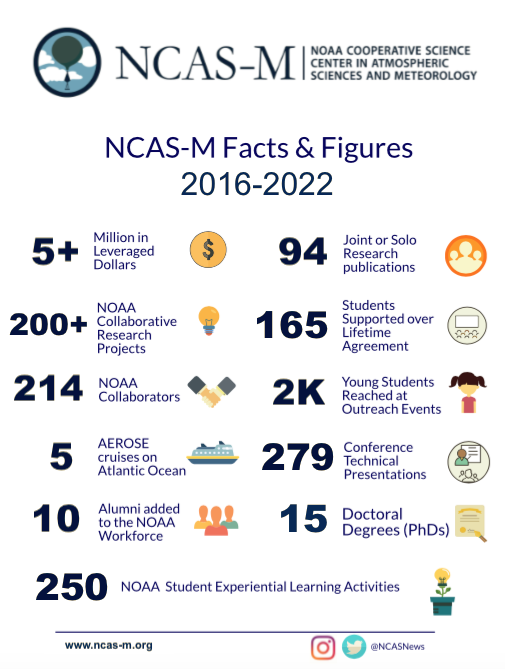Background
The goal of NOAA’s Educational Partnership Program (EPP) with Minority Serving Institutions (MSI) is to increase the number of students, particularly from traditionally underrepresented and historically excluded communities, who are trained and graduate in science, technology, engineering, and mathematics (STEM), natural resource management and policy fields that directly support NOAA’s mission. The graduates are future workforce candidates for career paths in the NOAA mission enterprise.
Since the first Educational Partnership Program with Minority Serving Institutions (EPP/MSI) Cooperative Science Center (CSC) awards were made in 2001, the program has supported, training of over 4,135 students and graduated students who earned more than 2,521 degrees in NOAA mission STEM, natural resource management, and/or policy fields. Degrees earned included 1,300+ Undergraduates; 550+ Master’s; and, 300+ doctorates. An additional 179 students are currently pursuing degrees as part of these programs. These students are qualified to become the future STEM workforce at NOAA, other natural resources and environment agencies, academia, the private sector, and non-governmental organizations. More than 2,021 CSC students who earned degrees with support from EPP/MSI CSCs have transitioned to NOAA employment. Over the past years, these partnerships have produced considerable research products including over 935 peer-reviewed publications, 822 collaborative research projects with NOAA, and two patents.
Impressively, from 2003 through 2019, 54% of African-Americans awarded doctoral degrees in atmospheric sciences and 21% of all Hispanics awarded doctoral degrees in atmospheric sciences to underrepresented students in the United States were supported by NOAA EPP/MSI. NOAA’s Cooperative Science Center award recipients are doctoral-degree granting Minority Serving Institutions. Each lead institution partners with academic institutions from across the United States.
In September 2022, NOAA Office of Education announced a new five-year award of up to thirty million dollars ($30M), for the Howard University NOAA Center for Atmospheric Sciences and Meteorology. The recipient, Howard University is one of the nation’s Historically Black Colleges and Universities (HBCUs). This award brings together a consortium of 8 other academic institutions of higher education.
The Howard University (lead), a Historically Black Colleges and Universities (HBCU), with academic partners: Jackson State University, Penn State University, San Jose State University, State University of New York at Albany, University of Maryland Baltimore County, University of Maryland College Park, University of Puerto Rico, Mayaguez; and University of Texas-El Paso. The recipient makes subawards to each partner institution to perform CSC activities. The Center proposed themes that align with NOAA’s National Weather Service (NWS) Weather Ready Nation (WRN), Impact-based Decision Support Services (IDSS), and the NOAA Science Advisory Board Report on Priorities for Weather Research (PWR). The award is a cooperative agreement with NOAA personnel continually engaged in mentoring, experiential training, and collaborations to achieve the EPP/MSI Program goals. The NCAS-M II award is building institutional capacity in NOAA mission research priority areas. Center graduates are well prepared to enter the NOAA mission enterprise, and contribute within research and operational careers at NOAA and the National Weather Service.
NCAS-M II is comprised of 9 partners institutions:
- Howard University (Lead)
- Jackson State University
- Pennsylvania State University
- San Jose State University
- State University of New York at Albany
- University of Maryland Baltimore County
- University of Maryland College Park
- University of Puerto Rico Mayagüez
- University of Texas El Paso
These institutions represent a unique niche within an academic community that combines research-intensive institutions, advanced education, collaborative research training, and capacity-building in NOAA mission-relevant disciplines across all campuses. All NCAS-M II academic partners contribute to a rich spectrum of student training and professional development through workshops and webinars, shared courses and seminars, outreach activities, student recruitment, and mentoring.
The mission of NCAS-M II is to produce a diverse and highly trained cadre of technical and environmentally literate professionals who will help shape the nation’s future to build a Weather-Ready Nation by connecting accurate and timely forecasts and warnings to decisions that save lives and protect property.
NCAS-M II collaborates with NOAA and NOAA stakeholders in support of this mission in three thematic areas:
- Innovative observations for advancing climate, weather, and air quality analysis and prediction.
- Interdisciplinary scientific research to support modeling and forecasting activities for building community resilience against extreme weather, water, atmospheric, and climate events.
- Integrated research in support of building public safety through Impact-Based Decision Support Services (IDSS).
NCAS-M II draws on the talents of its faculty and students, NOAA employees, and other federal and private sector partnerships to address current and future challenges to improving NOAA NWS products and services.
More information on NCAS-M II

